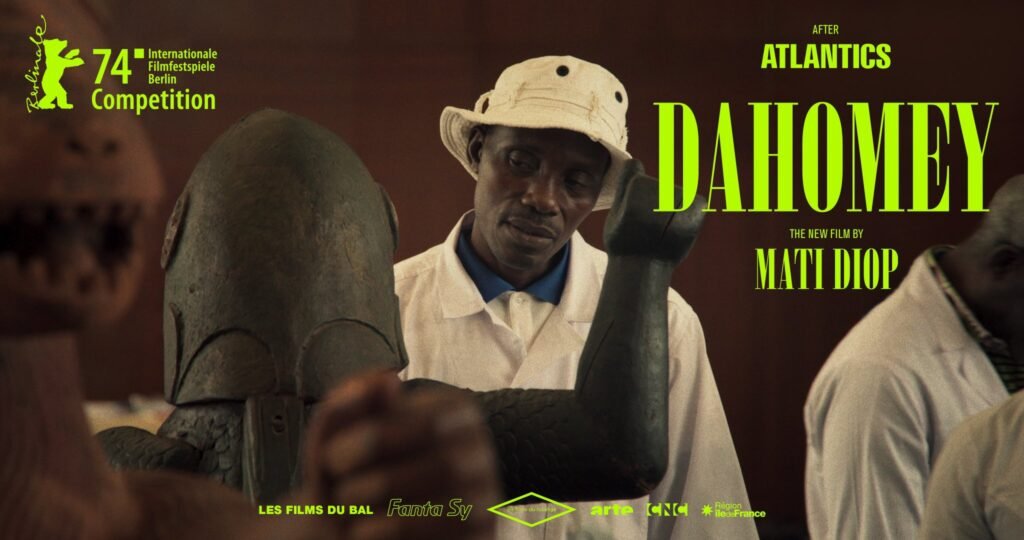
Dahomey
“Na raz crawled into his head, the notion that his roots, his culture, his education, his entire being had been kept safe somewhere abroad, perhaps rested overseas for a couple of centuries.”
The above quotation is one of many that can be found in Mati Diop’s attachment artistic documented feature “Dahomey”. The film narrates the story of the return of the 26 royal treasures belonging to the Kingdom of Dahomey, which was created in the 17th century. These items were returned to the Republic of Benin after being held in museums in Paris since late 2021. “Dahomey” is a documentary film about coming to terms with a history that has been fundamentally changed by colonialism. The British fought with the Kingdom of Dahomey and stole the artifacts when the conflict erupted in 1892. As a typical colonial body, France, having settled foreign country, committed both material and psychological violence against its indigenous people, thus boxing them from their history. Much of Africa’s history is a product of colonial expansionism, from language, education, the family settings and the cultural institutions of the colonies.
Like her first narrative feature cinematic work “Atlantics,” “Dahomey” merges life and death. In her narration, one of the returned artifacts is Malu which gives the documentary an impression of a ghost story in the making.
Known only as 26, the artifact, which is a sculpture of wood and metal, reflects its own passage from France back to its Beninese origin. It’s timbre is coarse and scratchy, the kind of sound that tells of age and hidden knowledge. At certain points, Diop casts 26 as the narrator. When it is packed up into a wooden box, we watch as the rays of light fade, with 26 still in the box. We are reacquainted with 26, as it makes the leap from being handled by French museum workers to embracing it in its true homeland the land of black, beautiful people. Like 26, we feel more comfortable in Benin, knowing that the history of injustice is at last over.
But then the discussion and controversy emerges, as the community begins to struggle with the void that the absence of their history had existed for ages. “Dahomey” is even more interesting when it does nothing but follow the journey of people who are accepting and discussing reparations, fully aware that time is quite still on their side. Plenty more artifacts are still waiting in France, without the slightest idea as far as dates for their repatriation are concerned.
For some, the future is bright, whilst for others, the scars are everlasting, and they will forever be viewed as subjugated peoples. Diop’s camera does not engage in assessing the dialogue, rather it wants to listen to the talk and inspire candidates for the discussion, on the screen as well as off it. Although they do not fully recount the long recitative of the dissolution of collecting the artifacts, the people’s have a sense of them, and seeing them makes the bitterness of what has been taken away their experience more real and even stronger. The self and history are entwined and so inseparable, in which elements of both are derived from one and the same phenomenon. Addressing crimes against history also means addressing the nature of identity, which is often tricky, as it is broken in many places across the globe, most of them being war zones. Such is Benin, where the people have only just started the very long journey of self rediscovery.
With the filmmakers cramming as much into 68 minutes, rather oddly though, “Dahomey” practically feels inadequate in terms of timing. If there is something to complain about, it is the lack of room for growth, for dialogue screens are so interesting that you will be hoping to see more of them hence extending the length of the movie. Being Black anywhere on the globe permanently means retelling and redrawing the maps of the historical picture. The heel of colonialism and dominion over others has touched each of us which is why our biggest weapon against that is simply to talk. It is not so easy as to define the struggles we have during the fight of getting back our belongings, but also in dealing with and condemning active aggressor’s cultural hostility aimed at whiting out history while reconstructing societies. Diop has taken it upon herself to create awareness through the film ‘Dahomey’ and uses it as a tool for activism. The film issues an appeal to the audience and evokes the past for the sake of future changes. It tackles the problems of oppression which affects all people. “Dahomey” is a stunning, heartbreaking, and evocative piece of art that should be allocated its proper time.
For More Movies Visit Putlocker.
Also, Watch On Putlocker.